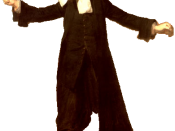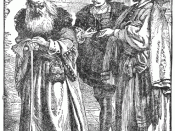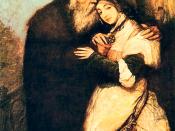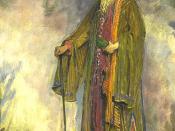In The Merchant of Venice Shylock seems to be the main character of the play that everyone focuses on. This is odd as the typical focus of a play would be the two young lovers. So what draws us to become so intrigued in this Shylock business? What makes each of us feel a different way about him at the end? It must be the age old question- Is Shylock the victim or villain? So many people have tried to answer this question, each with different views. Shylock is a victim, thereÃÂs no doubt about that, but he does bring most of his suffering upon himself. He does this by being greedy, cruel and vengeful.
***Shylock seems bent on revenge from the very beginning, which already tells us, since this play is a comedy, heÃÂs destined to get whatÃÂs coming to him. He is the one who started the whole bond obsession that ended in his demise.
He became preoccupied by revenge so much that he doesnÃÂt realise the errors he was making, like not stopping to ensure his bond had no loopholes and was legal, but he was to desperate to see Antonio dead that he did not stop to think of these things. He would not rest until Antonio was dead, and his only reason was that he spat on him.
***Shylock himself is the main cause for his misfortune as he is a cruel person. He brings it all about when he creates his bond, asking for a pound of flesh. This is a gruesome thing to ask for and shows a lot about his character. Shylock also mistreats people he has power over. He taunts his servant Lancelot and lashes out at him because he canÃÂt do so with any other Christians. He also mistreats his daughter, Jessica by trapping her in their home and handling her like a captive. His cruelness also shows when Bassanio offers Shylock three times the money owed to save Antonio but Shylock refuses. The only reason he would do this is because he wants to see Antonio die.
***Another reason that Shylock brings his misfortune on himself is that he is greedy. He is money orientated and values his money over people. An example of this is when Jessica ran away he mostly cared about the ducats and stones that she stole and not the fact that he might not ever see his daughter again. A character as greedy as this will always bring about his own demise in the end. Another example is that Shylock thinks Antonio is irrational for lending out money without interest where as he himself charges high interest rates and is quick to take action on those who donÃÂt pay it back.
***Others say that Shylock acted the way he did because he wanted to pay Christians back for mistreating him. This is only partly true as Shylock is very hypocritical. Shylock justified his actions because of the prejudice Christians showed towards him but he was no better. He called AntonioÃÂs friends ÃÂChristian foolsÃÂ and referred to their religious festivals as ÃÂShallow fopperyÃÂ. Shylock also contradicts himself with refusing to show mercy and when he realizes that heÃÂs doomed then he begins to beg for mercy from Antonio and the court.
***In conclusion, Shylock and others may try to justify his actions and claim that his misfortunes are due to others in this play and that he is a victim. In reality, all of his misfortunes are caused by himself. He mistreats everyone, Christian or not, he is powered by his greed and hatred and has his heart set on revenge.
Bibliography:www.sparknotes.com/shakespeare/merchant/www.enotes.com/merchant/www.online-literature.com/shakespeare/merchant/





